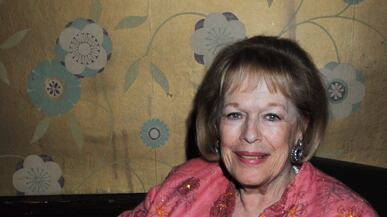Lady Antonia Fraser-Pinter is the author of 13 works of nonfiction and 10 novels. However, her 24th book, Must You Go?, a loving memoir of her life with the Nobel Prize-winning playwright Harold Pinter, is her greatest yet. In contrast to the serious, scholarly mien that cloaks her usual nonfiction, this book is rich with poetry and pathos. Unconsciously, perhaps, Fraser reveals more about what Pinter saw in her than what she saw in him.
Critics have always been as fascinated with Fraser herself as with her literary output. Long before she met Pinter, Fraser was a glittering member of the London literati. She was born in 1932, the oldest of eight children of the earl and countess of Longford. Despite the grand Anglo-Irish title and the glorious ancestry that could be traced back to England’s greatest general, the Duke of Wellington, Fraser’s parents were committed socialists and Catholics. They were also extraordinarily talented and charismatic individuals. Lady Elizabeth Longford (who died in 2002) is revered in Britain as one of the country’s greatest historical biographers. Lord Longford, an Oxford don, author, politician and campaigner for the underdog, is, unfortunately, best known today for his unsuccessful attempts to secure the release of Myra Hindley, the female half of the notorious Moors Murderers.
Lord Longford “was interested in penitents,” laughs Fraser when I visit her in London. Hindley claimed to have repented and this is why Longford campaigned against her life sentence, she explains. Ironically, he disapproved strongly of Fraser’s decision to leave her husband, the Conservative MP Sir Hugh Fraser, for Pinter, “in part because I was not penitent. Not penitent at all.”
But then, it wasn’t only Fraser’s parents who were shocked. The entire world reacted with a kind of fury and horror when Fraser and Pinter went public with their relationship in 1975. The press castigated both of them as moral derelicts: Fraser for “abandoning” her husband and six children, and Pinter for deserting his actress-wife Vivien Merchant, whose angry tirades to journalists helped to fuel the orgy of disapproval. Yet, as Fraser makes clear in her memoir, it was an inescapable coup de foudre for both of them when they met at a party on January 8, 1975, to celebrate the opening of Pinter’s play The Birthday Party. “Must you go?” he asked at the end of the evening, (hence the title of the memoir). She thought of the duties and burdens awaiting her, and recklessly replied, “No, it’s not absolutely essential.”
Gallery: Antonia Fraser and Harold Pinter’s Love Story

Despite the beautiful, limpid looks, and melodious voice, Fraser has always possessed a steely determination to do things her way. “I was born to be independent,” she tells me, with a deceptive smile. “I paid no attention to my parents’ opinion the first time I married, and no attention the second time, either.” But she did care about her brother Thomas’ opinion, who is only 11 months younger than her. “You have a special problem,” he told her: “You are a woman and a strong character yet you want your husband to be stronger. Women with strong characters who want to dominate are always fine because there are plenty of weak men around. Also plenty of strong men for weak women. But yours is a special problem." Fraser was furious at the time, but now says: "He's quite right in a maddening way."
“I am most proud of the poems,” she says, “because they were written to me. I am very proud that this remarkable man loved me.”
Nowadays, we might call Fraser’s "special problem" a rational desire for equality. But 35 years ago, Made in Dagenhem was not a charming indie film about equal pay for equal work, but a vitriolic political debate. It is a testament to Fraser that she never doubted herself or her choice as a career. "I just was a writer," she recalls. "I always wrote." Fortunately, after her marriage to Sir Hugh, financial necessity helped to ensure that neither motherhood nor her position as an MP’s wife became a bar to her chosen career.
Fraser had been writing journalism and popular history for 15 years when she published her runaway bestseller, Mary, Queen of Scots, in 1969. The idea for writing the book had come from Lady Elizabeth Longford, who, in 1966, had casually mentioned that she was thinking of choosing the tragic Catholic queen as her next subject. Fraser was outraged, jealous even: “You can’t write about her, she is my Mary,” she recalls saying. Thus galvanized by parental competition, Fraser went on to prove to the entire world that Mary was indeed hers.
By the time Harold and Fraser met, both were at the top of their careers: “fully formed” in Fraser’s words. There were many points of shared references between them but, crucially perhaps, no direct paths of competition. As a drama critic for the London Evening Standard, Fraser was more involved with the theater world that most people realize. “Harold and I used to joke that I liked the theater more than he did.” But she never tried to impress him, or worse, show off as a theater maven. Instead, from the first, Fraser was resolutely herself, while it was Pinter who was transformed into something like his better or even best self.
After eight months of dogged romance in the face of constant press intrusion—Private Eye mocked Fraser as Lady Magnesia Freelove—the two moved in together in a rented flat. The first moments are captured indelibly in Must You Go?:
"August 17, 1975. He took my hand and led me into the drawing room. Lo! A vast arrangement of foxy lilies and other glories in the window and another on the mantelpiece, a huge arrangement of yellow flowers in the pink boudoir... I shall never forget them. Or Harold's expression. A mixture of excitement, triumph, and laughter."
From the beginning, both agreed that “Harold and I needed to have... amnesty” when it came to their previous lives. Neither had a clean past. Pinter’s 24-year marriage to Merchant had been particularly troubled; he had had a long affair with the television presenter Dame Joan Bakewell from 1962 to 1969, which later formed the basis of his play Betrayal. Fraser and Pinter’s decision to look forward rather than back no doubt helped them to withstand the tragedies that followed. Merchant was broken-hearted by the divorce and drank herself to death. Pinter’s son, Daniel, blamed his father and never spoke to him again.
Even now, Fraser refuses to discuss either individual. She claims it is out of respect for their privacy. From any other person this might sound self-serving, but from Fraser it has the ring of truth. She is preternaturally unable to criticize—so much so that in 33 years of marriage to Pinter she only once told him off for one of his famous public rages. The occasion was a gala dinner during which Pinter began to harangue some unfortunate guest for his political views. Fraser took her place card and on the back scribbled: “Darling—you are right. So SHUT UP.” Pinter was evidently both touched and surprised since he kept the card in his desk along with his most precious souvenirs of their life together. Considering Fraser’s mild response to Pinter’s claim that the crimes of the U.S. government were as bad as Nazi Germany’s, one can only imagine what had driven her to act so uncharacteristically on that particular night.
Fraser’s reticence also extends to how much influence she had on Pinter’s work. She modestly claims to very little. But, tellingly, she admits to having suggested to Pinter that there was a scene missing in the first draft of Betrayal: "December 31, 1977: Harold very cross and went for a walk round Holland Park. Came back and wrote the scene. It was brilliant and not at all what I had asked for of course." She also persuaded him to pair the play Celebration with his first, The Room. As for Pinter’s influence on Fraser’s work, she credits him with being the ideal first reader. “He would ask questions. He had a very good eye and could immediately identify the gaps.”

“We did not discuss art or literature in the strict sense,” she says, “we lived it.” And my goodness, how they lived. Must You Go? is extraordinarily revealing about what it means to be a golden couple. For three decades, the Pinters enjoyed a life of great romantic passion that was blessed with fortune, public adulation, and friendships with the most interesting people the world has to offer. They also had a great deal of fun.
Fraser’s historical output grew in depth and acclaim, but Pinter wrote less as he aged. Instead he became more politically active, opening up a whole new world to explore and dominate. It was his illnesses, first cancer of the esophagus in 2001 followed by pemphigus, a rare auto-immune disease, that ended the great adventure. After 2001, they remained close to home, rarely traveling because he was in pain for much of the time. Gradually, it becomes clear in Must You Go? that Pinter’s fight to live was not just an understandable desire to stick around, but a testament to his love for Fraser. He was told to stop drinking—which he did for 37 days: “In order to live. And with you.” He told her. Finally, when informed that a drink would no longer make a difference, he went home and opened a bottle of Champagne. “Oh, the enjoyment of this glass!” he exclaimed. “I had forgotten how absolutely lovely Champagne was.” He died a week later.
Two years after Pinter’s death, Fraser has passed through the initial shock of losing her soul-mate. She talks of what she misses: “The holidays, when we took along so many books and ended up reading each other’s and discussing them.” And, most importantly, of what remains still constant and fresh to her: “Harold’s poems.” “I am most proud of the poems,” she says, “because they were written to me. I am very proud that this remarkable man loved me.”
Plus: Check out Book Beast, for more news on hot titles and authors and excerpts from the latest books.
Amanda Foreman is the author of A World on Fire: An Epic History of Two Nations Divided and The Duchess.





